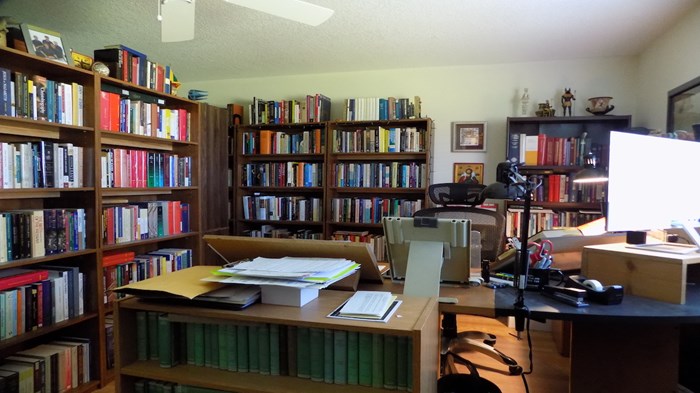How and Where I Write: David de Silva

David George Moore
It’s been my privilege to be in the personal spaces of several writers. Among others, Pulitzer winner Tony Horwitz warmly welcomed me at his home on Martha’s Vineyard as did William F. Buckley at his place on Long Island Sound.
I have interviewed over 200 authors. Everyone has their own style with reading, capturing what they have read, research, and then writing. As I writer myself, I have developed an approach I feel comfortable with.
David deSilva is Trustees’ Distinguished Professor of New Testament and Greek at Ashland Theological Seminary. He is the author of many books, among which is his stellar introduction to the New Testament. An Introduction to the New Testament: Contexts, Methods & Ministry Formation: deSilva, David A.: 9780830852178: Amazon.com: Books
Moore: Do you still acquire books as you get older or have you slowed down a bit?
deSilva: I’m still acquiring new bookcases to accommodate all the books I purchase. ���� I live 1,200 miles from my seminary’s library, however, so I have a good excuse.
Moore: What are the best time(s) and place(s) for you to write?
deSilva: Mornings are when I’m the freshest. I have fantasized about being able to write beside the sea, but I’m pretty much glued to my fourth-bedroom office.
Moore: How do you capture your research? Old school with note cards etc., or new school with computer programs?
deSilva: It’s a special treat for me to find a project for which I can take notes in a journal “old school,” but chiefly I just type notes and thoughts directly into unwieldly Word documents (for example, my notes for a forthcoming Ephesians commentary occupy about 350 single-spaced pages in a Word document – none of it is publishable text).
Moore: Do you immediately start writing on the computer (perhaps typewriter) or by longhand?
deSilva: I massage and arrange notes at length before I start trying to “script” the actual book. This was even true for my two forays into historical fiction. (Well, perhaps my critics would say that more of my books fall under the heading of “fiction” than that.)
Moore: Do you put marginalia in your physical books?
deSilva: I used to treat books as semi-sacred objects, but now I admittedly consume them with highlighting and marginal notes (and objections ����). I have become what I once hated.
Moore: Do you read digital books?
deSilva: Only if I can get them in printed form.
Moore: What is some good advice you received on writing?
deSilva: “Just get something down on paper. Start the writing.” I have had to learn to embrace the process of editing and re-writing so as to get over the mental block produced by wanting to write something “just right” the first time.
Moore: What do you think is your best book?
deSilva: I’ll answer this the way so many others have on Scot’s blog – by qualifying “best” by category so that I can name a few titles. ���� I’m probably proudest of my recent Galatians commentary in the NICNT (Eerdmans, 2018), because that’s a project that I really gave some years to developing and that stretched me at every turn to dig into more than I initially thought I would have to. I think An Introduction to the New Testament (rev. ed.; InterVarsity, 2018) is the “best” in the sense of offering the “most” to Christian leaders-in-training. Introducing the Apocrypha (rev. ed.; Baker Academic, 2018) is the “best” in terms of making a solid contribution to secondary literature on a rather neglected body of literature. But Day of Atonement: A Novel of the Maccabean Revolt (Kregel, 2015) is my favorite, because I had to put decades of research into texts, social relations, and history to the test of bringing a world to life.
Moore: Please name a few of your favorite authors from your own field of study
deSilva: This is tough, as I go to different authors eagerly for some very different things. As I had been in Revelation for a while, Craig Koester’s masterful commentary and Harry Maier’s engaging reading (of Revelation reading him, in a sense) are fresh favorites. In my more recent Ephesians research, Lynn Cohick’s NICNT volume is a new favorite alongside the stimulating take by Timothy Gombis. Over the decades, I’ve profited a great deal from Luke Johnson, Craig Evans, John P. Meier, Craig Keener, Ben Witherington, John Collins, Adela Yarbro Collins, and James Dunn.
Moore: What is a book you should have read by now, but haven't? This will make all of us sleep better!
deSilva: Augustine’s City of God. I’ve poked around it here and there for something specific, but I have wanted to read it cover to cover since I bought my Penguin Classics paperback copy thirty years ago.
David George Moore is the author of the forthcoming Stuck in the Present: How History Frees and Forms Christians (Leafwood/Abilene Christian University Press). Stuck in the Present: David George Moore: 9781684264605: Amazon.com: Books
Jesus Creed is a part of CT's
Blog Forum. Support the work of CT.
Subscribe and get one year free.
The views of the blogger do not necessarily reflect those of Christianity Today.


















